Home News & views Publications
Publications
By Jo Odell, Inspire Improvement Lead and Debbie Warren, FoNS Marketing and Communications Lead
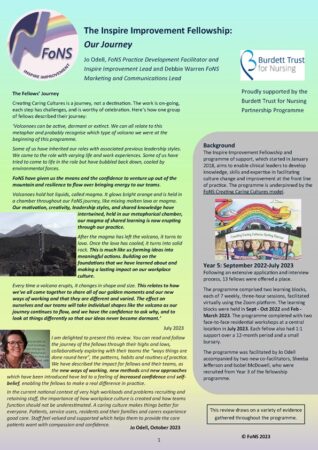 Through this review, you can explore the journey of the fellows, the highs and lows, as they collaboratively explore with their teams the ‘ways things are done round here’, the patterns, habits and routines of practice.
Through this review, you can explore the journey of the fellows, the highs and lows, as they collaboratively explore with their teams the ‘ways things are done round here’, the patterns, habits and routines of practice.
In this review, we describe the impact for fellows and their teams, as the new ways of working, new methods and new approaches which have been introduced have led to a feeling of increased confidence and self-belief, enabling the fellows to make a real difference in practice.
In the current national context of very high workloads and problems recruiting and retaining staff, the importance of how workplace culture is created and how teams function should not be underestimated. A caring culture makes things better for everyone. Patients, service users, residents and their families and carers experience good care. Staff feel valued and supported which helps them to provide the care patients want with compassion and confidence.
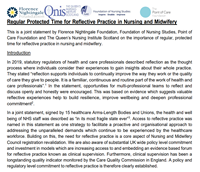 Florence Nightingale Foundation, Foundation of Nursing Studies, Point of Care Foundation and The Queen’s Nursing Institute Scotland
Florence Nightingale Foundation, Foundation of Nursing Studies, Point of Care Foundation and The Queen’s Nursing Institute Scotland
In 2019, statutory regulators of health and care professionals described reflection as the thought process where individuals consider their experiences to gain insights about their whole practice. They stated “reflection supports individuals to continually improve the way they work or the quality of care they give to people. It is a familiar, continuous and routine part of the work of health and care professionals”. In the statement, opportunities for multi-professional teams to reflect and discuss openly and honestly were encouraged. This was based on evidence which suggests valuable reflective experiences help to build resilience, improve wellbeing and deepen professional commitment.
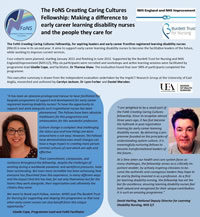 The Foundation of Nursing Studies
The Foundation of Nursing Studies
The FoNS Creating Caring Cultures Fellowship, for aspiring leaders and early career frontline registered learning disability nurses (RNLD) is now in its second year. It aims to support early career learning disability nurses to become the facilitative leaders of the future, while working to improve current services. Four cohorts were planned, starting January 2021 and finishing in June 2022. Supported by the Burdett Trust for Nursing and NHS England/Improvement (NHS E/I), fifty-six participants were recruited and workshops and active learning sessions were facilitated by programme lead Giselle Cope, and facilitator, Dr Theresa Shaw. The evaluation found that over 98% of participants completed the programme. This executive summary is drawn from the independent evaluation undertaken by the ImpACT Research Group at the University of East Anglia, researched and authored by Carolyn Jackson, Dr Lynn Furber and Daniel Marsden.
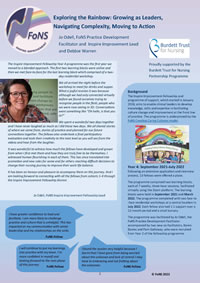 Jo Odell and Debbie Warren
Jo Odell and Debbie Warren
The Inspire Improvement Fellowship Year 4 programme was the first year we moved to a blended approach. The first two learning blocks were online and then we met face-to-face for the last learning block which comprised of a two day residential workshop. We all arrived the night before the workshop to meet for drinks and supper. What a joyful reunion it was because although we had only connected virtually before we found ourselves trying to recognise people in the flesh, people who we were now seeing in 3D. Conversations went something like “Oh hello, is that you Jo?”
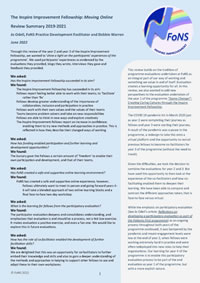 Jo Odell and Debbie Warren
Jo Odell and Debbie Warren
This review builds on the tradition of programme evaluations undertaken at FoNS as an integral part of our way of working and something we value in and of itself. Evaluation creates a learning opportunity for all. Through this review of the year 2 and year 3 of the Inspire Improvement Fellowship, we wanted to ‘shine a light on the participants’ experiences of the programme’. We used participants’ experiences as evidenced by the evaluations they provided, blogs they wrote, interviews they gave and feedback they provided.
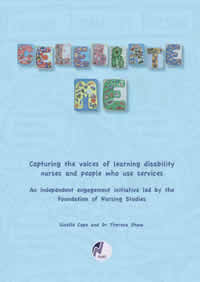 Giselle Cope and Dr Theresa Shaw
Giselle Cope and Dr Theresa Shaw
The purpose of this initiative was to engage with nurses and people using services to gather evidence and demonstrate the impact of learning disability nursing, from experience, to help sustain its future. The outcomes from our extensive engagement have enabled us to highlight everything that there is to celebrate about learning disability nursing (the impact) and what needs to be championed for the future (to sustain it), from the voices of learning disability nurses and those of people with a learning disability and their families. This work is important because it has brought to the fore the valued and unique contribution of learning disability nursing to help ensure greater equity for people with learning disabilities both on an individual level and across society. ‘Learning disability nurses are highly skilled, highly motivated, cost-effective and highly valued person-centred nurses. Wherever they work they have a proven track record for improving outcomes, reducing the impact of health inequalities and improving people’s lives. They have unique, enhanced communication and interpersonal skills, are important educators and can be part of the essential reasonable adjustments needed to reduce morbidity and unnecessary premature deaths of people who have learning disabilities’
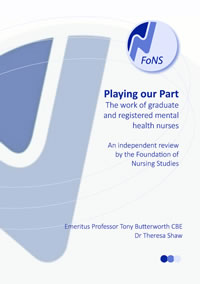 At the beginning of 2016, the Foundation of Nursing Studies began a year-long investigation into the work of graduate and registered mental health nurses. At a time when 1 in 4 of the UK population may develop a common mental health disorder, the profession of mental health nursing needs some thoughtful protection but must transform to meet these rising demands. At the time of compiling this study, the Prime Minister was outlining her vision to transform mental health support in our schools, workplaces and communities and it is vital that the profession itself is part of that discussion. The report starts by fundamentally rejecting the view that their specialist registration must be discontinued and suggests practical ways in which the discipline can be developed to meet the demands of the UK population. This study shows that graduate and registered mental health nurses can continue to have a vital role in providing care and preventing illness and that the experience and skill set of these 38 thousand currently registered nurses must be considered in any major policy changes. In our report, we offer 20 key messages that have emerged from our work with the profession, people who use services, researchers, policy makers and educators. We suggest 6 step changes with practical suggestions that should make a positive difference to both service delivery and to the profession.
At the beginning of 2016, the Foundation of Nursing Studies began a year-long investigation into the work of graduate and registered mental health nurses. At a time when 1 in 4 of the UK population may develop a common mental health disorder, the profession of mental health nursing needs some thoughtful protection but must transform to meet these rising demands. At the time of compiling this study, the Prime Minister was outlining her vision to transform mental health support in our schools, workplaces and communities and it is vital that the profession itself is part of that discussion. The report starts by fundamentally rejecting the view that their specialist registration must be discontinued and suggests practical ways in which the discipline can be developed to meet the demands of the UK population. This study shows that graduate and registered mental health nurses can continue to have a vital role in providing care and preventing illness and that the experience and skill set of these 38 thousand currently registered nurses must be considered in any major policy changes. In our report, we offer 20 key messages that have emerged from our work with the profession, people who use services, researchers, policy makers and educators. We suggest 6 step changes with practical suggestions that should make a positive difference to both service delivery and to the profession.
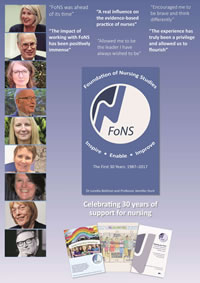 Dr Loretta Bellman and Professor Jennifer Hunt
Dr Loretta Bellman and Professor Jennifer Hunt
We are delighted to introduce this book charting the history of FoNS over the past thirty years. It is remarkable to look back on the growth of the organisation to date, starting with the ambitions of three people at the Wellington Hospital to contribute to nursing across the NHS. FoNS’ first strapline – ‘Putting Research into Practice’ – reflected a clear response to the advice and direction of key nurse experts from policy, practice and academia at the time. Arguably, challenges that the profession was experiencing to spread research and see it translated into improvements in practice remain present today. FoNS was in a unique position as an independent charity to speak out and challenge the status quo. Its approach of consulting widely and working collaboratively has earned tremendous respect, something that has helped sustain the organisation’s activity and strengthen its presence over three decades. FoNS has never stood still, seeking to stay in step with the needs of nursing across health and social care and to make sure everything the organisation does ultimately makes a difference to people who use services. Today, our ambitions extend beyond simply promoting the use and spread of research to an aspiration to inspire and enable a culture that values people, helps patients to experience care and services that are the best they can be, and allows staff to feel appreciated and supported. A vision we believe stays true to and builds on FoNS’ early charitable objectives to advance the nursing profession and improve patient care.
 By Frederick Marais
By Frederick Marais
Drawing on experiences in London and the USA, this book, published by FoNS in July 2002, provides a descriptive and reflective account of the development and impact of a fully integrated nurse-led tuberculosis control programme with a case management approach. This model for tuberculosis control provides the TB Nurse with an enhanced role. As Case Manager, the TB Nurse, is the interface for fully integrated individualised patient-focused care and effective tuberculosis control, functioning across traditional barriers such as those between medical specialities and hospital and community settings. This ensures continuity of care, sustains a consistent, co-ordinated and supportive approach and fosters adherence to treatment, promoting both individual and public health. From 1995 to 1997 the author, Frederick Marais, was employed at St Mary’s NHS Trust Hospital as TB/HIV Clinical Nurse Specialist to develop and manage a TB Service specifically for individuals co-infected with tuberculosis and HIV, and from 1997 until the end of 2000 as Manager and Lead Nurse to develop and manage a seamless Trust-wide nurse-led TB Service.
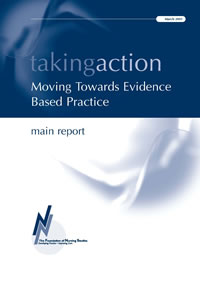 titleOver a period of seven years (1994-2000), FoNS was involved in the development, organisation and evaluation of a number of activities to assist nurses to critically appraise and apply research/evidence in their everyday practice. Taking Action reports on the evaluation of a UK-wide programme of work: • The organisation of nine critical appraisal skills/research utilisation workshops and a short term evaluation of these which is reported in full in Reflection for Action (FoNS, 1996) • A long-term evaluation of the impact of these workshops • A consultation exercise designed to validate and update the findings of the evaluations Implications for the evolution of evidence-based practice are drawn out for the R&D agenda, education and professional development, trust management, individual practitioners, and for FoNS itself. Taking Action and a series of associated reports are available to download in PDF format by clicking on the links below:
titleOver a period of seven years (1994-2000), FoNS was involved in the development, organisation and evaluation of a number of activities to assist nurses to critically appraise and apply research/evidence in their everyday practice. Taking Action reports on the evaluation of a UK-wide programme of work: • The organisation of nine critical appraisal skills/research utilisation workshops and a short term evaluation of these which is reported in full in Reflection for Action (FoNS, 1996) • A long-term evaluation of the impact of these workshops • A consultation exercise designed to validate and update the findings of the evaluations Implications for the evolution of evidence-based practice are drawn out for the R&D agenda, education and professional development, trust management, individual practitioners, and for FoNS itself. Taking Action and a series of associated reports are available to download in PDF format by clicking on the links below:
Other Associated Reports
An opportunity to explore a variety of ideas as well as FoNS’s unique perspectives on current health and social care issuess…
Without any cost to you, you can support FoNS just by shopping online


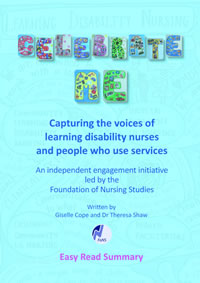 Giselle Cope and Dr Theresa Shaw
Giselle Cope and Dr Theresa Shaw